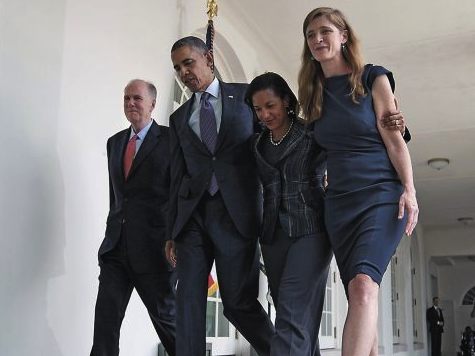One of the luxuries of being a new administration appointee is being able to duck blame, politely or otherwise, for the mistakes of your predecessor. On Syria, new UN Ambassador Samantha Power does not have that luxury. Yet she continues to act as if she bears none of the responsibility for the acute crisis now facing the Obama administration and the world in Syria.
On Sep. 6, Power spoke to a friendly audience at the Center for American Progress–which opposed the Bush administration’s attempts to isolate Bashar al-Assad’s regime–to make the case for war. She spoke about the efforts President Barack Obama has made to deter the use of chemical weapons in Syria, which had been ignored by Syria or blocked by Russia and China.
Not once did Power mention the Atrocities Prevention Board, which she helped to create in 2012, and which she chaired–and which remained largely silent as the Syria crisis worsened. She has never explained its inaction as the death toll climbed, as the first reports of chemical weapons use by the Assad regime emerged, or its evident failure to prevent the use of potentially genocidal tools.
Nor did Power mention her broader role in crafting the Obama administration’s foreign policy as Special Assistant to the President and Senior Director for Multilateral Affairs and Human Rights, her former post at the National Security Council. During her tenure, the Obama administration expanded diplomatic relations with the Assad regime and regarded him as a “reformer.”
In both of those roles, Power failed to confront–or helped to coddle–one of the world’s worst dictatorships, or to take any action against the deaths of 100,000 people in a war often waged against civilians. Though she cites Israel’s security in defending Obama’s attack plans, by the time she took office Syria already had a track record of grim violence and terror in Israel and Lebanon.
One of the main obstacles Obama faces in Congress is a lack of trust, built over years of confrontation (from both sides) and threats of unilateral action (from Obama alone). If the president were to make clear that he had been wrong about Assad, and if he accepted responsibility for the present crisis, that might make his case easier. Power’s remarks suggest no such humility is on offer.

COMMENTS
Please let us know if you're having issues with commenting.